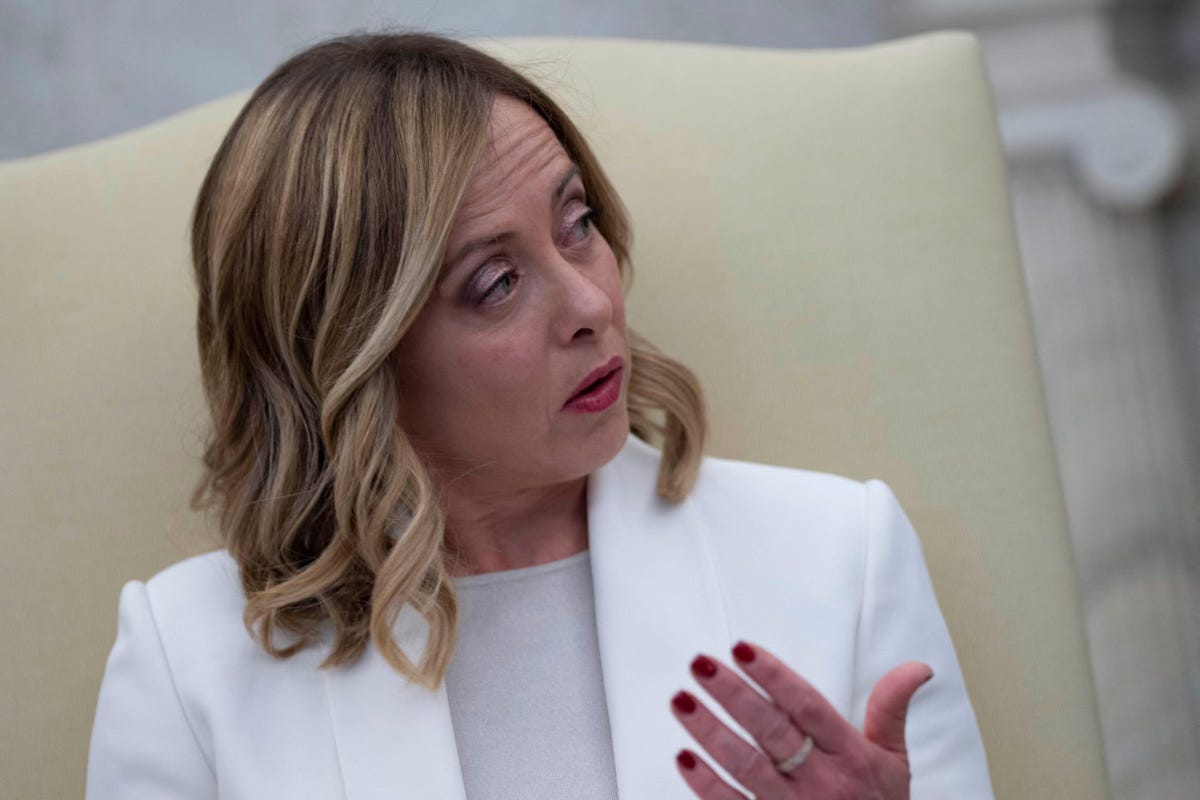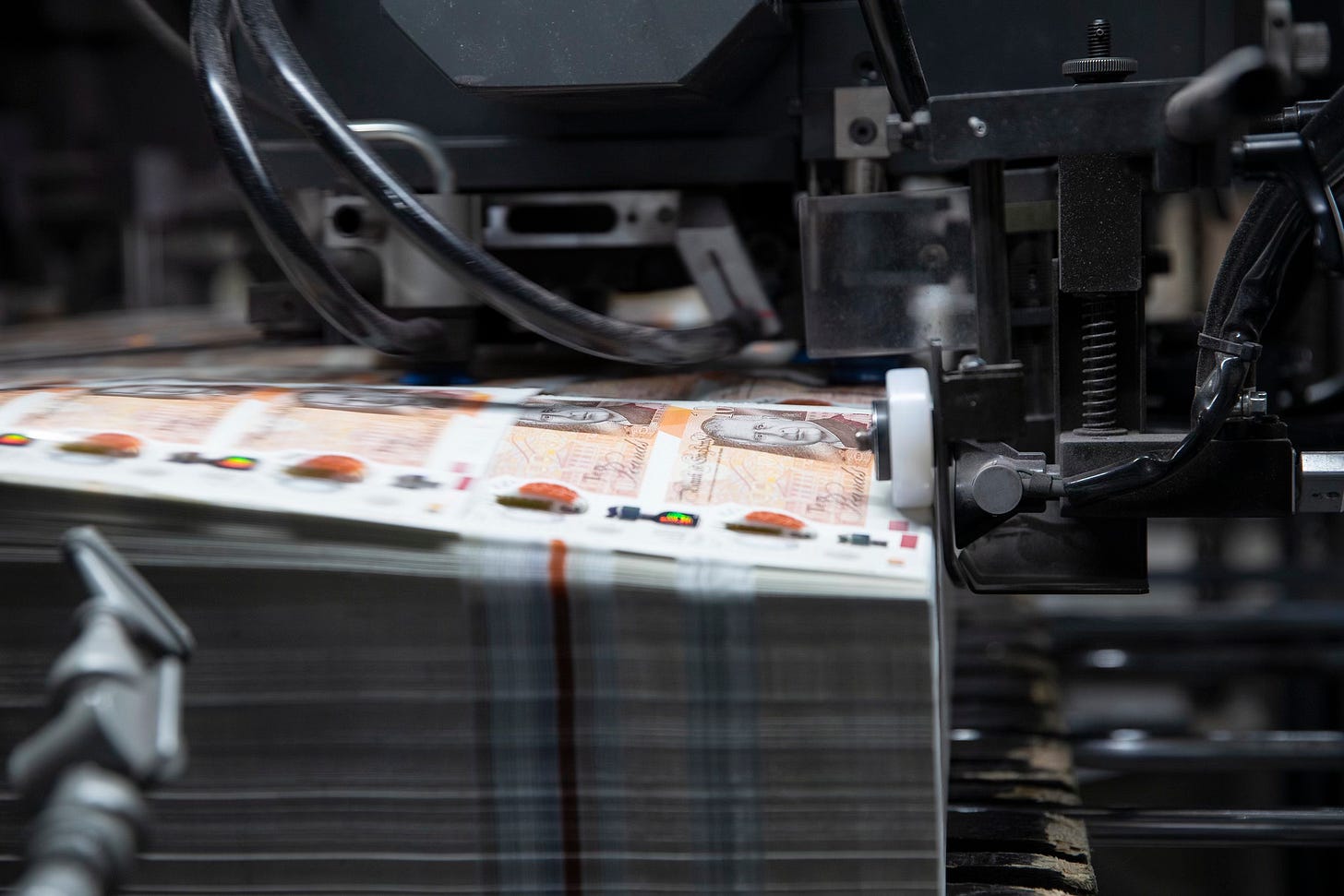
Italian Prime Minister, Giorgia Meloni, is in Washington today with a big task on her hands: charming Donald Trump into softening his stance on the EU.
The pair are expected to host a joint post-talks press conference this evening.
Nicknamed the “Trump whisperer”, key figures in Brussels have singled out Meloni as the person best placed to sweet talk Trump into not imposing any higher tariffs on the EU. Or, even better, agreeing to a zero-tariff deal with the bloc, so long as it commits to buying US natural gas.
The EU Commission has signalled it has confidence in Meloni – the first European leader to visit the White House since “liberation day” – with a spokeswoman saying “any outreach to the US is very welcome”.
Italy’s foreign ministry insists its leader “is going to champion a European stance” while Meloni herself has vowed to do her best, telling reporters: “I am aware of what I represent and of what I am defending”.
Meloni has every reason to take her mission seriously. She is especially vulnerable to Trump’s erratic trade policy. The US is Italy’s third biggest non-EU trading partner and the tariffs announced by Trump earlier this month prompted Rome to halve its growth forecast.
It’s also not hard to see why Brussels regards Meloni as a suitable ambassador for this particular mission.
While many EU leaders lack a natural affinity with the Trump administration, to put it mildly, Trump has heaped praise on Italy’s first female leader, labelling her a “fantastic woman” who has “really taken Europe by storm”. She was the only European leader to attend his inauguration back in January.
When Meloni, who hails from a political party with neo-fascist roots, was elected back in 2014, she was labelled Italy’s first far-right premier since the end of the Second World War.
While she has sought to moderate her image in power, she doesn’t struggle to find common ground with Trump’s administration. Addressing a US conservative conference in February, she railed against “globalist elites” and “woke ideology”, and any criticism she has made of his administration’s foreign policy has been very cautious.
Trump aside, she appears to be enjoying a budding friendship with Elon Musk, who she has hosted twice in Rome.
Back in September, Musk presented Meloni with an award during a gala dinner in New York, where he gushed to the 700 guests that she was “even more beautiful on the inside than she is on the outside”. Meloni responded by labelling the so-called First Buddy a “precious genius”. A seemingly flirtatious photo of the pair from the night even prompted Musk to take to X to deny rumours that they were involved with one another romantically.
If any European leader can persuade the Trump administration to go soft on Brussels, it’s surely Meloni. But even she may fail.
While a US-UK trade deal looks increasingly likely – with White House officials saying they expect a trade deal with the UK to be signed “within three weeks” – there is every reason to expect Trump to be much tougher on the EU.
For starters, unlike Britain, the EU announced retaliatory tariffs on Washington after Trump introduced his – now paused – 20% tariffs on Brussels earlier this month. We’re already witnessing how far Trump is willing to go to punish China for deciding to retaliate.
What’s more, the US President, who has previously claimed that “the European Union was formed in order to screw the United States” is a lifelong Eurosceptic.
Ironically, Meloni can find some common ground with him on this point too.
When she was first elected, commentators branded her “Italy’s first Eurosceptic PM”. And many EU leaders worried she would cause the bloc a similar headache to the one already inflicted by Hungary’s trouble-maker PM, Viktor Orban.
Instead, she surprised her EU critics by toeing the mainstream European line on foreign policy and becoming a strong supporter of Ukraine.
That Meloni has managed to forge a successful working relationship with EU chief Ursula von der Leyen reflects not just moderation on her part but the fact that the bloc’s policy on immigration has hardened in recent years, moving closer to where Meloni stands.
Regardless, it’s ironic that the once ardent eurosceptic now finds herself crossing the Atlantic on a mission to, in the words of her own foreign ministry “champion a European stance”.
And EU leaders who used to revile her find themselves relying her on more than ever.
That is, unless she does her newfound EU allies dirty. Some more distrusting Europeans have voiced concern that, once in the privacy of the Oval Office, she could be tempted to go it alone and argue for more favourable terms for Italy. Italian officials insist she will do no such thing.
Caitlin Allen
Deputy Editor
Neil Collins
The great quantitative easing disaster, revisited

READ HERE
Patrick Barrow
Rory McIlroy has some big choices to make

READ HERE
Life on a distant planet – Scientists have found the “strongest evidence yet” that a faraway planet 124 light years away from Earth may be home to alien life. According to a Cambridge University study, there is a 99.7% chance that theexoplanet K2-18b has large quantities of dimethyl sulfide in its atmosphere, a chemical only produced by living organisms.
Lammy in Paris – UK Foreign Secretary, David Lammy, is in Paris today meeting his US counterpart, Marco Rubio, and US envoy, Steve Witkoff, to discuss the war in Ukraine.
Israel was poised to strike Tehran before Trump talks – According to US officials who spoke to The New York Times, Israel had developed plans to strike Iranian nuclear facilities in May but was waved off by Trump in recent weeks in favour of negotiating a deal with Tehran to limit its nuclear program. The second round of Iran-US nuclear talks is expected to be held in Rome on Saturday.
UK bans EVs with Chinese parts over spying fears – The MoD has banned electric vehicles with Chinese components from sensitive sites and military training bases, according to the i paper. Senior officials reportedly became alarmed when they discovered that sensors in EVs could be used to collect data and transfer it to Beijing.
-
Robot surgeons are on standby for more operations to cut NHS waits, reports The Times
-
Why autism remains a genetic mystery, in BBC Future
-
In a first, the British Army has used a radio-wave weapon to knock out drone swarms, reports Defense News
-
Thailand’s fragile democracy has taken another hit with the arrest of a US academic, writes The Conversation
-
How Iran is weaponising Europe’s criminal underworld, in New Lines.
